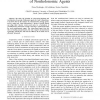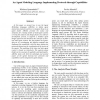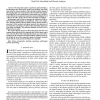3274 search results - page 34 / 655 » Using Learning in a Control Agent |
96
Voted
SEKE
2007
Springer
15 years 8 months ago
2007
Springer
— We present a statistical approach for software agents to learn ontology concepts from peer agents by asking them whether they can reach consensus on significant differences bet...
115
Voted
ATAL
2009
Springer
15 years 8 months ago
2009
Springer
The Modular Architecture for Bootstrapped Learning Experiments (MABLE) is a system that is being developed to allow humans to teach computers in the most natural manner possible: ...
ICRA
2006
IEEE
15 years 8 months ago
2006
IEEE
— We study the problem of vision-based flocking and coordination of a group of kinematic agents in 2 and 3 dimensions. It is shown that in the absence of communication among age...
136
Voted
IAT
2008
IEEE
15 years 8 months ago
2008
IEEE
In this paper we present how to use the Agent MOdeling LAnguage (AMOLA) to define agent interaction protocols and how to integrate these in an agent model. AMOLA provides the synt...
92
Voted
TSMC
2002
15 years 1 months ago
2002
By using other agents' experiences and knowledge, a learning agent may learn faster, make fewer mistakes, and create some rules for unseen situations. These benefits would be ...



